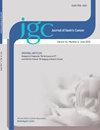III期胃癌D2切除后不同XELOX或SOX化疗周期的疗效观察
IF 3.2
4区 医学
Q2 GASTROENTEROLOGY & HEPATOLOGY
引用次数: 2
摘要
目的探讨胃癌(GC) D2根治术后化疗周期较短的卡培他滨+奥沙利铂(XELOX)或S-1 +奥沙利铂(SOX)方案患者的预后是否优于接受标准化疗周期的患者。材料与方法收集2011年1月至2016年5月哈尔滨医科大学肿瘤医院D2根治性切除术后接受XELOX或SOX化疗的患者资料。结果4、6、8个化疗周期患者的5年总生存率(OS)分别为59.4%、64.8%、62.7%。与接受4个化疗周期的患者相比,接受6个化疗周期的患者(风险比[HR], 0.882;95%置信区间[CI], 0.599-1.299;P=0.52)或8个周期(HR, 0.882;95% ci, 0.533-1.458;P=0.62)的化疗组没有明显延长OS。4、6、8个化疗周期患者的3年无病生存率(DFS)分别为62.1%、67.2%、60.8%。与接受4个化疗周期的患者相比,接受6个化疗周期的患者(HR, 0.835;95% ci, 0.572-1.221;P=0.35)或8个周期(HR, 0.972;95% ci, 0.606-1.558;P=0.91)的化疗组无明显延长DFS。然而,接受6个化疗周期的患者的3年DFS和5年OS率似乎优于接受4和8个化疗周期的患者。结论对于III期GC患者,4 - 6个周期的XELOX或SOX化疗可能是一个有利的选择。本研究为进一步的随机临床试验提供了理论依据。本文章由计算机程序翻译,如有差异,请以英文原文为准。
Efficacy of Different Number of XELOX or SOX Chemotherapy Cycles After D2 Resection for Stage III Gastric Cancer
Purpose We aimed to explore whether the prognosis of patients treated with capecitabine and oxaliplatin (XELOX) or S-1 and oxaliplatin (SOX) regimens who received fewer cycles of chemotherapy after D2 radical resection for gastric cancer (GC) would be non-inferior to that of patients who received the standard number of cycles of chemotherapy. Materials and Methods Data on patients who received XELOX or SOX chemotherapy after undergoing D2 radical resection at Harbin Medical University Cancer Hospital between January 2011 and May 2016 were collected. Results In patients who received 4, 6, and 8 cycles of chemotherapy, the 5-year overall survival (OS) rates were 59.4%, 64.8%, and 62.7%, respectively. Compared to patients who received 4 cycles of chemotherapy, those who received 6 cycles (hazard ratio [HR], 0.882; 95% confidence interval [CI], 0.599–1.299; P=0.52) or 8 cycles (HR, 0.882; 95% CI, 0.533–1.458; P=0.62) of chemotherapy did not exhibit significantly prolonged OS. The 3-year disease-free survival (DFS) rate of patients who received 4, 6, and 8 cycles of chemotherapy was 62.1%, 67.2%, and 60.8%, respectively. Compared to patients who received 4 cycles of chemotherapy, those who received 6 cycles (HR, 0.835; 95% CI, 0.572–1.221; P=0.35) or 8 cycles (HR, 0.972; 95% CI, 0.606–1.558; P=0.91) of chemotherapy did not show significantly prolonged DFS. However, the 3-year DFS and 5-year OS rates of patients who received 6 cycles of chemotherapy appeared to be superior to those of patients who received 4 and 8 cycles of chemotherapy. Conclusions For patients with stage III GC, 4 to 6 cycles of XELOX or SOX chemotherapy may be a favorable option. This study provides a rationale for further randomized clinical trials.
求助全文
通过发布文献求助,成功后即可免费获取论文全文。
去求助
来源期刊

Journal of Gastric Cancer
Biochemistry, Genetics and Molecular Biology-Cancer Research
CiteScore
4.30
自引率
12.00%
发文量
36
期刊介绍:
The Journal of Gastric Cancer (J Gastric Cancer) is an international peer-reviewed journal. Each issue carries high quality clinical and translational researches on gastric neoplasms. Editorial Board of J Gastric Cancer publishes original articles on pathophysiology, molecular oncology, diagnosis, treatment, and prevention of gastric cancer as well as articles on dietary control and improving the quality of life for gastric cancer patients. J Gastric Cancer includes case reports, review articles, how I do it articles, editorials, and letters to the editor.
 求助内容:
求助内容: 应助结果提醒方式:
应助结果提醒方式:


